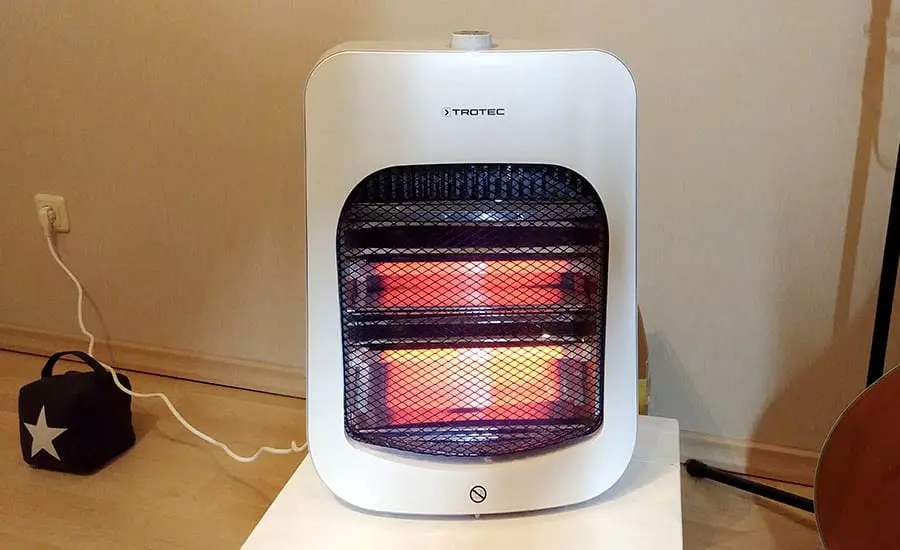Is it allowed to use space heaters in college dorms? Currently, I’m sitting in my dorm, with cold feet. My radiator (for some reason) decided not to heat this evening. Even though I can layer clothes and socks to keep warm, using a space heater would help so much.
But:
Are space heaters even allowed in dorms?
If you’re not sure whether your college allows space heaters in dorms, you’re in the right place. In this article, we’re going to cover everything you need to know about space heater rules in college dorms.
Not all universities have equal rules, but after researching I noticed a pattern that most universities followed. After reading this guide, you’ll know how to handle a space heater in your dorm and how to find out whether your college allows space heaters.
Are space heaters allowed in dorms?
Not all universities set the exact same rules for space heaters. That seems to have to do with the age of the residence building and the strictness of the individual university.
Of course, it makes sense to consider fire hazards and increased electricity usage. But when it gets freezing cold in the winter, helping yourself with a space heater would be a god’s gift.
Oftentimes, college dorms have set up strict security guidelines everyone has to follow.
If you’re unlucky, space heaters might even be prohibited in your dorm.
While some universities completely prohibit space heaters, others set up certain rules to follow, and a few others don’t restrict the use of space heaters at all.
An example of space heater dorm guidelines
For example:
The University of Louisville only allows space heaters that follow certain guidelines. Here are some of them.
- The space heater must have built-in tip-over protection (it should automatically shut off when it falls over).
- The power usage should be 1500W at max.
- You can’t use an extension cord (here’s our article that explains why you shouldn’t use extension cords with space heaters)
- The space heater must have a nationally recognized testing laboratory seal
Additionally, they have restrictions on the placement of the heater. For example, you should place in a certain distance from walls and inflammable objects.
While these guidelines sound strict at first you can actually fulfill them with most space heaters.
In contrast, Stanford University completely allows space heaters and recommends some sustainability guidelines meaning you should just keep an eye on electricity usage.
If you’re unlucky you belong to one of the dorms which totally prohibit space heaters like at Michigan State University.
If you keep reading, you’ll find a short list of some universities and whether they allow space heaters.

Why are space heaters not allowed in all dorms?
In the news, you always hear about house fires that were caused by unattended space heaters. Universities are afraid of this. Think of their reputation in case a space heater fire breaks out in one of their dorms.
Space heaters are a potential fire hazard. That’s why some universities prohibit the use of them.
Space heaters could overload and damage the main power supply.
If a few people in your dorm use space heaters at the same time, chances are that some fuses blow.
And on top of that, your rent oftentimes includes the electricity bill. No matter how much electricity you use, your rent stays the same. At least that’s the case in my dorm. To avoid extra costs and increase the profit margins, your dorm wants to keep the electric bill low and prohibits space heaters (sad, but true).
Here’s what Stanford says:
There are approximately 1,000 space heaters on campus that together cost the university $150,000 per year.
Stanford University - Space Heater How-to Guide
However, I believe (and most universities have recognized that as well) that space heaters are not bombs or dangerous chemicals. If you handle them responsibly, you can minimize the risk.
Microwaves are dangerous as well. That’s why everyone is following the guideline to not put cutlery in it.
So, certain dorms decided to set up security guidelines and allow the usage of space heaters if you follow the rules.
Individual University Examples - Does your University allow space heaters?
Here’s a quick list of universities and their space heater rules for dorms.
- MIT- Allowed, with security guidelines
- University of Louisville - Restricted, only if you follow guidelines - preferably radiant heaters
- Stanford - Allowed, but recommend sustainability guidelines
- University of Washington - Strongly discouraged, but not prohibited
- Michigan State University - Prohibited
- University of Wisconsin - Strictly limited
As you can see, the regulations vary from university to university. To find out whether your university allows space heaters, just google for “your university space heater dorms”.
If you don’t find any results you can speak to the property management and ask them.
But I’d just assume that if there are no rules prohibiting space heaters, they’re allowed.
How to keep warm in a cold dorm
It feels like college dorms are always older buildings with sporadically working heating systems. And sometimes it seels like nothing works as it should.
College dorms often have an old and ineffective heating system.
I used to be in one where you had no radiator but hot water pipes running through each room. The worst about it was that the pipes were never hot and you couldn’t do anything about it, because there was no thermostat to control them.
On top of that, universities insist to use these heating systems. I believe it’s because they want to save energy. They say these heating systems are energy-efficient (of course they are if they don’t heat at all).
In extreme cases they keep the room barely above freezing temperature - that’s why I believe space heaters make sense
But how can you heat your college dorm?
Hot plates and toaster ovens should never be used for space heating.
Well, of course, that’s not a good idea.
Let’s take a look at how you can keep warm in a cold dorm.
Electric blanket
Electric blankets are the best heating choice if space heaters are not allowed in your dorm. You can snuggle up in the blanket and be comfortable.
Electric blankets are great if you’re alone in your dorm. You can keep yourself warm.
If you have guests, you can turn on the electric blanket and put it on your bed. For sure this will raise the temperature by a few degrees.
Space heaters
As long as you use space heaters according to the guidelines of the University of Louisville above, you’ll certainly be safe. As long as you follow the rules, space heaters are not as dangerous as many people fear.
However, you don’t really know how fragile the house power supply of your college dorm is. You don’t want to be the reason for a blown fuse.
Therefore, I recommend using heaters that use less than 1000W of power. Most 1500W heaters have a power setting, where you can decrease the heat to 750W.
Personally, I own an 800W infrared heater, and it’s working well for my dorm.
Conclusion - Are space heaters allowed in dorms?
Answer: In most dorms, space heaters are allowed to use if you follow certain guidelines. These guidelines are about placing the space heater in a safe spot, using only certified space heaters, built-in tip-over protection and using not more than 1500W power. In fact, most space heaters fulfill these guidelines and you can responsibly use your space heater in your dorm.
If your dorm prohibits the use of space heaters, electric blankets are an effective and safe alternative.
They’ll keep you warm, even if the heating system of your dorm doesn’t work properly.
Always dress appropriately, drink hot beverages (I love to drink tea to keep warm), and wear thick socks.
Not only will these things keep you warm, but you’ll also be more comfortable.
Space heaters are not the only solution to heat a college dorm. If they are allowed, use them. If not, there’s so much more you can do. So, don’t worry.
I hope I could help you with this article! I recommend to check out the other heater guides.
